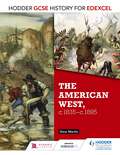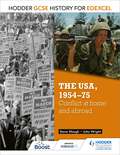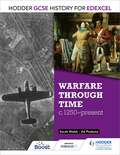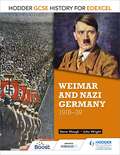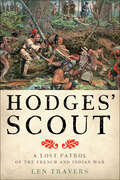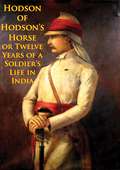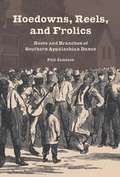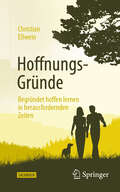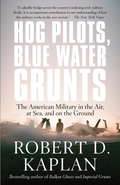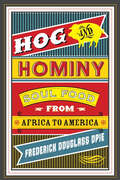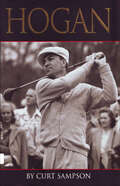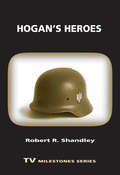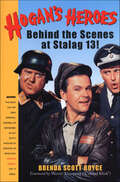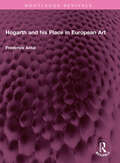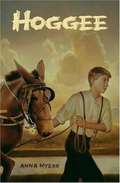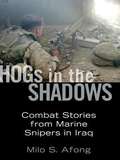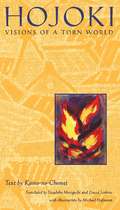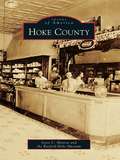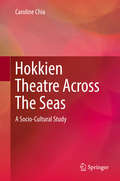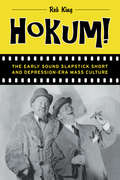- Table View
- List View
Hodder GCSE History for Edexcel: The American West, c.1835-c.1895 (Hodder Gcse History For Edexcel Ser.)
by Dave MartinExam Board: Pearson EdexcelLevel: GCSESubject: HistoryFirst teaching: September 2016First exams: June 2018Endorsed for EdexcelEnable students to achieve their full potential while ensuring pace, enjoyment and motivation with this popular series from the leading History publisher for secondary schools.> Blends in-depth coverage of topics with activities and strategies to help students to acquire, retain and revise core subject knowledge > Uses an exciting mix of clear narrative, visual stimulus materials and a rich collection of contemporary sources to capture students' interest> Helps students to maximise their grade potential and develop their exam skills through structured guidance on answering every question type successfully> Builds on our experience publishing popular GCSE History resources, providing you with accurate, authoritative content written by experienced teachers who understand the content and assessment requirementsThe American West, c.1836-95 covers all three key topics in the specification: 'The early settlement of the West, c.1835-c.1862'; 'Development of the plains, c.1862-c.1876'; 'Conflicts and conquest, c.1876-c.1895.'
Hodder GCSE History for Edexcel: The American West, c.1835-c.1895 (Hodder Gcse History For Edexcel Ser.)
by Dave MartinExam Board: Pearson EdexcelLevel: GCSESubject: HistoryFirst teaching: September 2016First exams: June 2018Endorsed for EdexcelEnable students to achieve their full potential while ensuring pace, enjoyment and motivation with this popular series from the leading History publisher for secondary schools.> Blends in-depth coverage of topics with activities and strategies to help students to acquire, retain and revise core subject knowledge > Uses an exciting mix of clear narrative, visual stimulus materials and a rich collection of contemporary sources to capture students' interest> Helps students to maximise their grade potential and develop their exam skills through structured guidance on answering every question type successfully> Builds on our experience publishing popular GCSE History resources, providing you with accurate, authoritative content written by experienced teachers who understand the content and assessment requirementsThe American West, c.1836-95 covers all three key topics in the specification: 'The early settlement of the West, c.1835-c.1862'; 'Development of the plains, c.1862-c.1876'; 'Conflicts and conquest, c.1876-c.1895.'
Hodder GCSE History for Edexcel: The Usa 1954-75
by John Wright Steve WaughExam Board: Pearson EdexcelLevel: GCSESubject: HistoryFirst teaching: September 2016First exams: June 2018Endorsed for EdexcelEnable students to achieve their full potential while ensuring pace, enjoyment and motivation with this popular series from the leading History publisher for secondary schools.> Blends in-depth coverage of topics with activities and strategies to help students to acquire, retain and revise core subject knowledge > Uses an exciting mix of clear narrative, visual stimulus materials and a rich collection of contemporary sources to capture students' interest> Helps students to maximise their grade potential and develop their exam skills through structured guidance on answering every question type successfully> Builds on our experience publishing popular GCSE History resources, providing you with accurate, authoritative content written by experienced teachers who understand the content and assessment requirementsThe USA, 1954-75: conflict at home and abroad covers all four key topics in the specification: 'The development of the civil rights movement '; 'Protest, progress and radicalism, 1960-75'; 'US involvement in the Vietnam War, 1954-75'; 'Reactions to, and the end of, US involvement in Vietnam, 1964-75.'
Hodder GCSE History for Edexcel: The Usa 1954-75
by John Wright Steve WaughExam Board: Pearson EdexcelLevel: GCSESubject: HistoryFirst teaching: September 2016First exams: June 2018Endorsed for EdexcelEnable students to achieve their full potential while ensuring pace, enjoyment and motivation with this popular series from the leading History publisher for secondary schools.> Blends in-depth coverage of topics with activities and strategies to help students to acquire, retain and revise core subject knowledge > Uses an exciting mix of clear narrative, visual stimulus materials and a rich collection of contemporary sources to capture students' interest> Helps students to maximise their grade potential and develop their exam skills through structured guidance on answering every question type successfully> Builds on our experience publishing popular GCSE History resources, providing you with accurate, authoritative content written by experienced teachers who understand the content and assessment requirementsThe USA, 1954-75: conflict at home and abroad covers all four key topics in the specification: 'The development of the civil rights movement '; 'Protest, progress and radicalism, 1960-75'; 'US involvement in the Vietnam War, 1954-75'; 'Reactions to, and the end of, US involvement in Vietnam, 1964-75.'
Hodder GCSE History for Edexcel: Warfare through time, c1250–present
by Sarah Webb Ed PodestaExam Board: Pearson EdexcelLevel: GCSESubject: HistoryFirst teaching: September 2016First exams: June 2018Endorsed for EdexcelEnable students to achieve their full potential while ensuring pace, enjoyment and motivation with this popular series from the leading History publisher for secondary schools.> Blends in-depth coverage of topics with activities and strategies to help students to acquire, retain and revise core subject knowledge > Uses an exciting mix of clear narrative, visual stimulus materials and a rich collection of contemporary sources to capture students' interest> Helps students to maximise their grade potential and develop their exam skills through structured guidance on answering every question type successfully> Builds on our experience publishing popular GCSE History resources, providing you with accurate, authoritative content written by experienced teachers who understand the content and assessment requirementsWarfare through time, c.1250-present covers both the thematic study 'Warfare and British society, c.1250-present' and the study of the historic environment 'London and the Second World War, 1939-45.'
Hodder GCSE History for Edexcel: Weimar And Nazi Germany
by John Wright Steve WaughExam Board: Pearson EdexcelLevel: GCSESubject: HistoryFirst teaching: September 2016First exams: June 2018Endorsed for EdexcelEnable students to achieve their full potential while ensuring pace, enjoyment and motivation with this popular series from the leading History publisher for secondary schools.> Blends in-depth coverage of topics with activities and strategies to help students to acquire, retain and revise core subject knowledge > Uses an exciting mix of clear narrative, visual stimulus materials and a rich collection of contemporary sources to capture students' interest> Helps students to maximise their grade potential and develop their exam skills through structured guidance on answering every question type successfully> Builds on our experience publishing popular GCSE History resources, providing you with accurate, authoritative content written by experienced teachers who understand the content and assessment requirementsWeimar and Nazi Germany, 1918-39 covers all four key topics in the specification: 'The Weimar Republic, 1918-29'; 'Hitler's rise to power, 1919-33'; 'Nazi control and dictatorship, 1933-39'; 'Life in Nazi Germany, 1933-39.'
Hodder GCSE History for Edexcel: Weimar and Nazi Germany, 1918-39
by John Wright Steve WaughEndorsed for EdexcelHelp your students achieve their full potential while ensuring pace, enjoyment and motivation with this unique series from the leading History publisher; developed by expert educators who know how to instil deep subject knowledge and an appetite for lifelong learning.- Provides distinct approaches to the different components of the 2016 specification, ensuring that your classroom resources are tailored to learners' changing needs as they progress through the curriculum- Caters for varying learning styles, using an exciting mix of clear narrative, visual stimulus materials and a rich collection of contemporary sources to capture the interest of all students- Helps students maximise their grade potential and develop their exam skills through structured guidance on answering every question type successfully- Blends in-depth coverage of topics with activities and strategies to help students acquire, retain and revise core subject knowledge across the years- Builds on our experience publishing popular GCSE resources to supply you with accurate, authoritative content written by experienced teachers who understand the practical implications of new content and assessment requirementsWeimar and Nazi Germany, 1918-39 covers all four key topics in the specification: 'The Weimar Republic, 1918-29'; 'Hitler's rise to power, 1919-33'; 'Nazi control and dictatorship, 1933-9'; 'Life in Nazi Germany, 1933-9.'
Hodges' Scout: A Lost Patrol of the French and Indian War (War/Society/Culture)
by Len TraversA gritty look at the French and Indian War through the lens of the bloody skirmish of Hodges' Scout, the heretofore untold story of a lost patrol.In September 1756, fifty American soldiers set off on a routine reconnaissance near Lake George, determined to safeguard the upper reaches of the New York colony. Caught in a devastating ambush by French and native warriors, only a handful of colonials made it back alive. Toward the end of the French and Indian War, another group of survivors, long feared dead, returned home, having endured years of grim captivity among the native and French inhabitants of Canada.Pieced together from archival records, period correspondence, and official reports, Hodges' Scout relates the riveting tale of young colonists who were tragically caught up in a war they barely understood. Len Travers brings history to life by describing the variety of motives that led men to enlist in the campaign and the methods and means they used to do battle. He also reveals what the soldiers wore, the illnesses they experienced, the terror and confusion of combat, and the bitter hardships of captivity in alien lands. His remarkable research brings human experiences alive, giving us a rare, full-color view of the French and Indian War—the first true world war.
Hodson Of Hodson’s Horse Or Twelve Years Of A Soldier’s Life In India [Illustrated Edition]
by George H. Hodson Major William S. R. Hodson[Illustrated with over one hundred maps, photos and portraits, of the battles, individuals and places involved in the Indian Mutiny]The Letters and memoirs of the ferocious leader of cavalry Major William Hodson, whose exploits, deeds and misdeeds during the Indian Mutiny have remained the stuff of legend."Hodson, the son of a clergyman, was born on 19 March 1821, near Gloucester, England. A Cambridge graduate, he entered the Company's service in 1845 and saw action in the First Sikh War (1845-46) in the Bengal Grenadiers. As Adjutant of the Guides, he played an important role in the Second Sikh war ( 1848-49 ); he took command by 1852, creating jealousies..."A contemporary described Hodson as tall man with yellow hair, a pale, smooth face, heavy moustache, and large, restless, rather unforgiving eyes. The British General Hugh Gough thought of him a perfect swordsman, nerves like iron, and a quick, intelligent eye. Hodson delighted in fighting and his favourite weapon was the hog-spear. He was a brilliant horseman with the capacity to sleep in the saddle. "On the outbreak of the Indian Mutiny, Hodson was reinstated with a commission and raised a regiment of 2,000 irregular cavalry which became famous as 'Hodson's Horse' and which took part in the siege of Delhi. As well, Hodson was Head of the Intelligence department and his spies reported accurately on rebel troop movements within the city and the damage done by British guns. "After Delhi's capture, Hodson rode to Humayun's tomb where he captured the aged Emperor Bahadur Shah and shot to death the Moghul princes as after the latter had surrendered at the same place. That act, plus his vengeful treatment of Indians during the Mutiny and unproved charges against him of looting, darkened his reputation. He then took part in the fighting before Kanpur, but was killed on 12 March 1858 during the successful British attack at Lucknow."-oldmartinianassociation.
Hoedowns, Reels, and Frolics: Roots and Branches of Southern Appalachian Dance
by Phil JamisonIn Hoedowns, Reels, and Frolics, old-time musician and flatfoot dancer Philip Jamison journeys into the past and surveys the present to tell the story behind the square dances, step dances, reels, and other forms of dance practiced in southern Appalachia. These distinctive folk dances, Jamison argues, are not the unaltered jigs and reels brought by early British settlers, but hybrids that developed over time by adopting and incorporating elements from other popular forms. He traces the forms from their European, African American, and Native American roots to the modern day. On the way he explores the powerful influence of black culture, showing how practices such as calling dances as well as specific kinds of steps combined with white European forms to create distinctly "American" dances. From cakewalks to clogging, and from the Shoo-fly Swing to the Virginia Reel, Hoedowns, Reels, and Frolics reinterprets an essential aspect of Appalachian culture.
Hoffnungs-Gründe: Begründet hoffen lernen in herausfordernden Zeiten
by Christian EllweinHoffnung in stürmischen Zeiten – Warum wir Grund zur Zuversicht haben Krisen, Kriege, Klimawandel – unsere Welt wirkt oft aus den Fugen geraten. Doch dieses Buch macht Mut: Es zeigt anhand historischer Beispiele, dass solche Umbrüche kein neues Phänomen sind – und dass Menschen in der Geschichte immer wieder Wege gefunden haben, damit umzugehen. Faktenbasiert und inspirierend zeigt der Autor auf, wie Menschen in der Vergangenheit Herausforderungen gemeistert haben – und was wir heute daraus lernen können. Hoffnung ist dabei nicht nur ein Gefühl, sondern eine Kraft, mit der wir aktiv unsere Gegenwart und Zukunft gestalten können. Dieses Buch bietet konkrete Impulse: Wie wir unsere Resilienz stärken, unsere Selbstwirksamkeit entfalten und Hoffnung in Taten verwandeln – im persönlichen Leben ebenso wie in Politik und Wirtschaft. Es lädt dazu ein, nicht zu verzweifeln, sondern zu handeln. Ein inspirierender Begleiter für alle, die sich nach Orientierung sehnen – und bereit sind, selbst Teil der Lösung zu sein. Mit Geleitwort von Herrn Dr. Andreas Krafft, der als Psychologe an der Universität St. Gallen u.a. das „Hoffnungsbarometer&“ verfasst.
Hog Pilots, Blue Water Grunts: The American Military in the Air, at Sea, and on the Ground
by Robert D. KaplanKaplan lets readers experience up close the American military worldwide in the air, at sea, and on the ground: flying in a B-2 bomber, living on a nuclear submarine, and traveling with a Stryker brigade on missions around the world. Provided unprecedented access, Kaplan moves from destroyers off the coast of Indonesia to submarines in the central Pacific, from simulated Iraqi training grounds in Alaska to technology bases in Las Vegas, from army and marine land forces in the heart of the Sahara Desert, to air bases in Guam and Thailand and beyond. Hog Pilots, Blue Water Grunts provides not only a riveting ground-level portrait of the Global War on Terrorism on several continents, but also a gritty firsthand account of how U. S. soldiers, sailors, marines, and airmen are protecting sea-lanes, providing disaster relief, contending with the military rise of China, fighting the war in Iraq, and crafting contingency plans for war with North Korea and Iran. Expanding on Kaplan's acclaimed Imperial Grunts, the first volume of his exploration of the American military, which "offers the reader an enlightened way to understand what is happening in the world" (San Francisco Chronicle), Hog Pilots, Blue Water Grunts shifts focus to the Pacific, where emerging Asian powers present vexing diplomatic and strategic challenges to U. S. influence. In this volume, Kaplan completes his analysis of army Special Forces and the marines, while also taking readers into the heart of the myriad tribal cultures of the air force, surface and subsurface navies, and the regular army's Stryker brigades. Kaplan goes deep into their highly technical and exotic worlds, and he tells this story through the words and perspectives of the enlisted personnel and junior officers themselves-men and women who, as he writes, have "had their national identities as Americans engraved in sharp bas-relief." This provocative and illuminating book, like Imperial Grunts before it, not only conveys the vast scope of America's military commitments, which rarely make it into the news, but also shows us astonishing and vital operations right as they unfold-from the point of view of the troops themselves.
Hog and Hominy: Soul Food from Africa to America (Arts and Traditions of the Table Perspectives on Culinary History)
by Frederick Douglass Opie&“Opie delves into the history books to find true soul in the food of the South, including its place in the politics of black America.&”—NPR.org Frederick Douglass Opie deconstructs and compares the foodways of people of African descent throughout the Americas, interprets the health legacies of black culinary traditions, and explains the concept of soul itself, revealing soul food to be an amalgamation of West and Central African social and cultural influences as well as the adaptations blacks made to the conditions of slavery and freedom in the Americas. Sampling from travel accounts, periodicals, government reports on food and diet, and interviews with more than thirty people born before 1945, Opie reconstructs an interrelated history of Moorish influence on the Iberian Peninsula, the African slave trade, slavery in the Americas, the emergence of Jim Crow, the Great Migration, the Great Depression, and the Civil Rights and Black Power movements. His grassroots approach reveals the global origins of soul food, the forces that shaped its development, and the distinctive cultural collaborations that occurred among Africans, Asians, Europeans, and Americans throughout history. Opie shows how food can be an indicator of social position, a site of community building and cultural identity, and a juncture at which different cultural traditions can develop and impact the collective health of a community. &“Opie goes back to the sources and traces soul food&’s development over the centuries. He shows how Southern slavery, segregation, and the Great Migration to the North&’s urban areas all left their distinctive marks on today&’s African American cuisine.&”—Booklist &“An insightful portrait of the social and religious relationship between people of African descent and their cuisine.&”—FoodReference.com
Hog and Hominy: Soul Food from Africa to America (Arts and Traditions of the Table: Perspectives on Culinary History)
by Frederick OpieFrederick Douglass Opie deconstructs and compares the foodways of people of African descent throughout the Americas, interprets the health legacies of black culinary traditions, and explains the concept of soul itself, revealing soul food to be an amalgamation of West and Central African social and cultural influences as well as the adaptations blacks made to the conditions of slavery and freedom in the Americas.Sampling from travel accounts, periodicals, government reports on food and diet, and interviews with more than thirty people born before 1945, Opie reconstructs an interrelated history of Moorish influence on the Iberian Peninsula, the African slave trade, slavery in the Americas, the emergence of Jim Crow, the Great Migration, the Great Depression, and the Civil Rights and Black Power movements. His grassroots approach reveals the global origins of soul food, the forces that shaped its development, and the distinctive cultural collaborations that occurred among Africans, Asians, Europeans, and Americans throughout history. Opie shows how food can be an indicator of social position, a site of community building and cultural identity, and a juncture at which different cultural traditions can develop and impact the collective health of a community.
Hogan
by Curt SampsonThis updated edition of a NEW YORK TIMES best seller includes a final chapter, which chronicles the last years of his life and examines his enduring legacy. Included are quotes and tributes from many of golf's greats such as Byron Nelson and a perceptive assessment of the life and legend of the man who may have been the greatest golfer ever-Ben Hogan.
Hogan's Heroes
by Robert R. ShandleyAnalyzes the unique satirical social and political commentary offered by Hogan's Heroes during a volatile period in American history.
Hogan's Heroes: Behind the Scenes at Stalag 13!
by Brenda Scott RoyceAn insider’s look at the surprisingly successful, perennially popular classic 1960s sitcom set in a prisoner-of-war camp in World War II Germany.If your fondest TV memories involve the POWs of Stalag 13 cleverly outwitting their captors, Schultz stammering “I know nothing!” and Hochstetter threatening to send everyone to the Russian front, then this is the book for you. This fun and informative book takes you behind the scenes of the classic 1960s sitcom to reveal:the story behind the creation, production, and eventual cancellation of the seriesthe controversy surrounding the show’s unlikely premiseinterviews with many of the show’s stars and crewbiographies of the stars and supporting actorsa detailed guide to each of the 168 episodesa guide to collecting Hogan’s memorabilia and more . . . Hogan’s Heroes is more popular now than ever before, especially in Germany, where it has become a surprising cult hit. In this book, most of the show’s stars and behind-the-scenes personnel share their memories and reflect on the series’ enduring popularity.
Hogarth and his Place in European Art (Routledge Revivals)
by Frederick AntalFirst published in 1962, Hogarth and his Place in European Art attempts to convey the historical relevance, both in its native and European context, of perhaps the most outstanding English painter of the eighteenth century. Dr. Antal applies his method of establishing the close relationship between the political and social history and the arts and letters of the period. Thus, the book goes far beyond the limits of art historical appreciation. It gives a panoramic picture of the first half of the eighteenth century in England with all its social, literary, and artistic connotations. He shows how England, which during those years became both politically and economically the most advanced country in Europe, could provide in Hogarth, in spite of the slender native tradition, the most progressive artistic personality of his time – whose work revealed the views and tastes of a broad cross-section of society. He traces Hogarth’s stylistic origins back to their European sources and analyses his impact on contemporary European and English art as well as the influence he exerted on generations to come. This book will be of interest to students of art, art history, literature, and European history.
Hoggee
by Anna MyersAlways overshadowed by his competitive older brother, especially in their work as mule drivers on the Erie Canal, fourteen-year-old Howard finally finds the courage to pursue his dreams of becoming an educator after he learns about sign language and teaches it to his deaf friend in nineteenth-century New York State.
Hogs in the Shadows
by Milo S. AfongThere is a special breed of Marine for whom the prey is the enemy--and every day is hunting season. This Marine is a HOG--a Hunter of Gunmen. These are the gripping, gut-wrenching true stories of those Marines in Iraq whose sole purpose on the battlefield is to eliminate the enemy--one combatant at a time. Every time a HOG puts his eye to the glass, it means death for his target. Here, former Scout/Sniper Team leader Milo S. Afong reveals what it takes to be a Hunter of Gunmen. He describes the intensive training that turns expert infantrymen into one-shot life-takers, how they operate in the field--and under fire--and how HOGs get the job done under any conditions. From sniping from a rooftop in Baghdad, to unknowingly being surrounded in a palm grove in the city of Hit, these stories will transport you right into the heat of the desert war, where one squeeze of the trigger can make all the difference.
Hoist a Cold One!: Historic Bars of the Southwest
by Melody GrovesThrowing a few drinks back at the bar is a timeless tale of humanity. In the American Old West, this tale played out in ramshackle huts and stylish establishments alike in some of the most unforgiving terrain imaginable. While the legendary Crystal Palace in Tombstone, Arizona, had little in common with the tent cities that sprang up in Leadville, Colorado, and Silver City, New Mexico, one common feature was the bars—constructed of planks of mahogany, cherrywood, or rosewood. These bars were often hauled across hundreds of miles of rugged terrain to arrive in various cities, where they would support the elbows, chins, and drinks of those who sought to quench their thirst.From the Grand Hotel in Bisbee to Rosa&’s Cantina in El Paso, Myke and Melody Groves tell the story of the front and back bars of twenty-five establishments in Arizona, Texas, New Mexico, and Colorado through a combination of historic background and photographs. This lively travelogue, complete with driving directions, will inspire visitors to the West&’s old mining camps, railroad towns, and ranching centers to stop in and belly up to the bar.
Hoke County (Images of America)
by Joyce C. Monroe Raeford-Hoke MuseumHoke County is located in the Sandhills region of North Carolina between the beaches and mountains. In the beginning, the countryside was covered with magnificent pine forest. Most of the early settlers were Highland Scots who started many of the region's churches. As communities grew, families were concerned about the education of their children. The first high school, Raeford Institute, was established in 1891. The village of Raeford, now the county seat, was chartered in 1901. J. W. McLauchlin, known as the father of Hoke County, was a state senator from Cumberland County. He introduced a bill in 1911 to form Hoke County from parts of Cumberland and Robeson Counties. Today the county has two golf courses, a wind tunnel, an ethanol plant, the Carolina Horse Park, Burlington Industries, and Unilever. The Fort Bragg Military Reservation covers a large part of the county, increasing the military population. Hoke is one of the top five fastest growing counties in North Carolina due to Base Realignment and Closure (BRAC).
Hokkien Theatre Across The Seas: A Socio-Cultural Study
by Caroline ChiaThis book adopts a refreshing approach by examining Hokkien theatre in a region connected by maritime networks, notably southern Fujian, Taiwan, Kinmen and Singapore. It considers how regional theatre is shaped by broader socio-cultural and political contexts and the motivation to stay relevant in an era of modernisation and secularisation. Political domains are often marked out by land boundaries, but the sea concept denotes fluidity, allowing theatrical forms to spread across these ‘land-bounded’ societies and share a common language and culture."This is an insightful theatrical study on the web of Chinese cultural networks in southern China and Singapore, and by extension, between China and Southeast Asia in the twentieth century and beyond. Using diverse sources in multiple languages and extensive field ethnography, this is a ground-breaking study which is both didactic and inspiring."- Lee Tong Soon, author of Chinese Street Opera in Singapore (University of Illinois, 2009)."Focusing on Hokkien theatre, this book offers new insights into how Chinese performing art responds to geographical, temporal, and social changes. Historical sources in different languages are widely used to give access to the cultural characteristics of Hokkien theatre, offering valuable ethnographic reports on the contemporary practices of Hokkien theatre in Taiwan, Kinmen, and Singapore. The book comments on the changing ritualistic significance of Hokkien theatre, and help us understand how societies remember the past of a performing tradition, and shape its present."- Luo Ai Mei, Co-Editor of A Preliminary Survey of the Cantonese Eight Song Cycles in South China: History and Sources (2016)
Hokum!: The Early Sound Slapstick Short and Depression-Era Mass Culture
by Rob KingA free ebook version of this title is available through Luminos, University of California Press’s Open Access publishing program. Visit www.luminosoa.org to learn more. Hokum! is the first book to take a comprehensive view of short-subject slapstick comedy in the early sound era. Challenging the received wisdom that sound destroyed the slapstick tradition, author Rob King explores the slapstick short’s Depression-era development against a backdrop of changes in film industry practice, comedic tastes, and moviegoing culture. Each chapter is grounded in case studies of comedians and comic teams, including the Three Stooges, Laurel and Hardy, and Robert Benchley. The book also examines how the past legacy of silent-era slapstick was subsequently reimagined as part of a nostalgic mythology of Hollywood’s youth.
